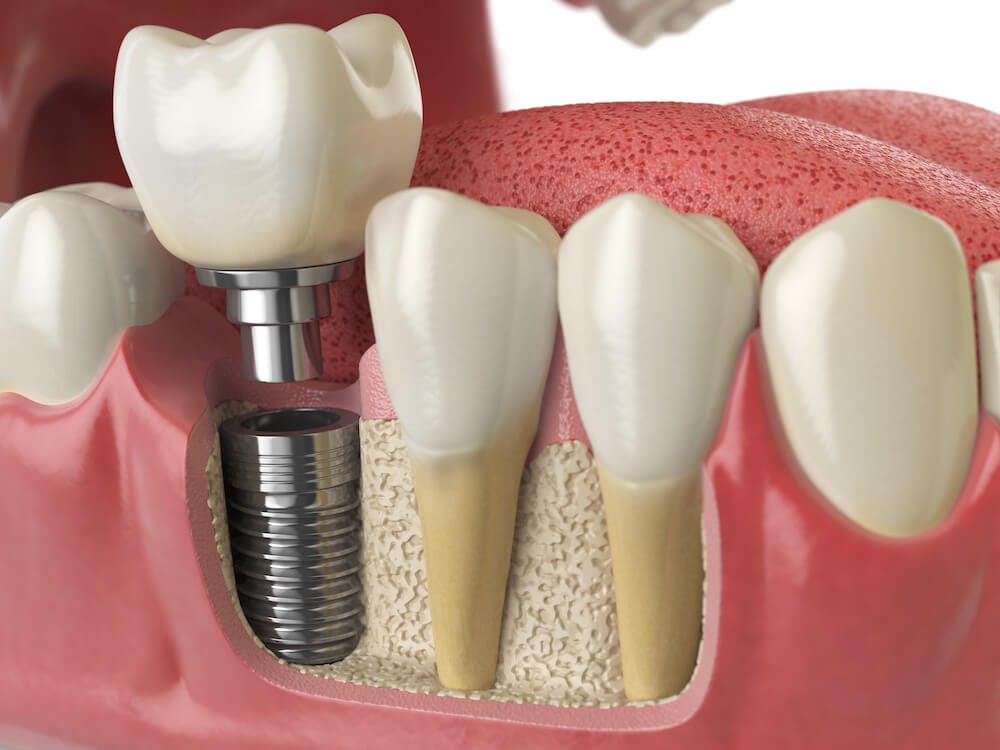Those with missing teeth once had to be resigned to dental bridgework or even to partial or full dentures if they had lost too many teeth. However, a dental implant is a better option for many patients today. Dental implants offer strong and long-lasting solutions to fill in gaps from missing teeth. Learn more about how to replace missing teeth with dental implants here, or schedule a consultation with Dr. Pham to get started with this treatment.

What Is a Dental Implant?
A dental implant is a post that can be placed deep into your jawbone and capped with a dental crown. These artificial teeth mimic natural tooth roots. They have been used for several decades and have been greatly improved during that time. While subperiosteal implants were once used routinely, they are rarely if ever used today because of the proven efficacy of endosteal implants. Endosteal implants are implanted in the bone rather than only in the gum tissue.

When Can Dental Implants Be Used?
Many individuals can benefit from dental implants to replace missing teeth. Implants can be used to replace a single tooth or several teeth. However, they should only be used in adults whose jawbones are fully formed and who have sufficient bone to support the implant post. Implants are recommended to patients who are unable or unwilling to wear partials or dentures. In addition, a good candidate will have healthy gums and will be willing to care for the implant to maintain its health.
A secure and lasting solution.
Never be embarrassed again. You’ll be smiling in no time.
What Are the Benefits of Dental Implants?
Dental implants are more beneficial than you may even be able to imagine. Besides the obvious cosmetic benefit of having a gorgeous, natural-looking smile once again, implants can actually preserve the overall health of your jaw. Tooth roots stimulate bone growth, keeping the jaw healthy and strong, and implant posts can do much the same.
In addition, dental implants are an incredibly risk-free procedure with a very high success rate. As long as you follow your dentist’s instructions, you can expect the area to heal quickly and the finished results to be incredibly durable. Getting a missing tooth replaced can help you speak and chew better. Finally, implants are far more comfortable and secure than traditional dentures or partials.
What Is the Dental Implant Process?
Dental implants take some time to place, and requires a healing period. You will have to wait several months between the time that you have the implant placed and the time when you can get the crown. Of course, your first step will be to have a complete consultation with Dr. Tuan Pham and to determine whether an implant is the right choice for you. Dr. Pham will then create a customized treatment plan for you.
This is a surgical procedure that will require sedation and local anesthesia for comfort as the implant is placed into your jaw. If you do not have sufficient bone, you may first need bone grafting in the area. The implant post is surgically placed into the bone, and you will have to wait several months to let the bone grow and heal around the implant. Once the implant is placed in your jawbone, osseointegration begins. During this process, the jawbone grows into and unites with the surface of the dental implant. Due to the osseointegration between the implant and jawbone, the implant will not slip, make noise or cause bone damage the way fixed bridgework, partials or dentures might. When osseointegration is complete, you will need an additional procedure to expose the implant for the placement of the abutment. An abutment is the piece where the crown will eventually attach. This minor procedure is typically done with local anesthesia. Once your gums heal, you’ll have more impressions made of your mouth and remaining teeth in preparation of your final restoration.
How Should You Care for Your Dental Implants?
Once the dental implant has been fully placed with the crown on top, you can treat it much as you do your natural teeth. You should gently brush it at least twice per day and should floss and clean around the area with an oral irrigator. Be sure to visit Dr. Pham regularly to ensure that the entire area stays healthy.



